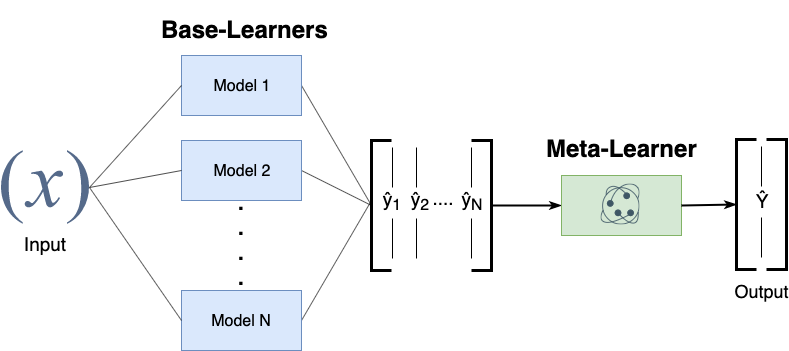jcborges / Deepstack
Programming Languages
Labels
Projects that are alternatives of or similar to Deepstack
DeepStack
DeepStack: Ensembles for Deep Learning
DeepStack is a Python module for building Deep Learning Ensembles originally built on top of Keras and distributed under the MIT license.
Installation
pip install deepstack
Stacking
Stacking is based on training a Meta-Learner on top of pre-trained Base-Learners. DeepStack offers an interface to fit the Meta-Learner on the predictions of the Base-Learners. In the following an Example based on top of pre-trained Keras Models (there is also an interface for generic models):
Usage
from deepstack.base import KerasMember # For a generic (i.e., Non-Keras Model) check the class `Member`
from deepstack.ensemble import StackEnsemble
model1 = ... # A Keras pre-trained Model (Base-Learner)
train_batches1 = ... # A numpy tuple (X_train, y_train) or Keras Data Iterator - Training Data for Meta-Learner
val_batches1 = ... # A numpy tuple (X_val, y_val) or Keras Data Iterator - Validation Data for Meta-Learner
member1 = KerasMember(name="Model1", keras_model=model1, train_batches=train_batches1, val_batches=val_batches1)
model2 = ...
train_batches2 = ...
val_batches2 = ...
member2 = KerasMember(name="Model2", keras_model=model2, train_batches=train_batches2, val_batches=val_batches2)
stack = StackEnsemble()
stack.add_member(member1) # Assumption: the data iterators of base-learners iterate over the same data and have same shape and classes.
stack.add_member(member2)
stack.fit() # Fits meta-learner based on training batches from its members (base-learners)
stack.describe() # Prints information about ensemble performance based on validation data
Check an example on the CIFAR-10 dataset: Cifar10.py.
Randomized Weighted Ensemble
Ensemble Technique that weights the prediction of each ensemble member, combining the weights to calculate a combined prediction. Weight optimization search is performed with randomized search based on the dirichlet distribution on a validation dataset.
It follows the same interface of the StackEnsemble. An example can be found in Cifar10.py.
Citing DeepStack
If you use DeepStack in a scientific publication, we would appreciate citations:
@misc{
title = {DeepStack: Ensembles for Deep Learning},
author = {Julio Borges},
url = {https://github.com/jcborges/DeepStack},
date = {2019}
}



